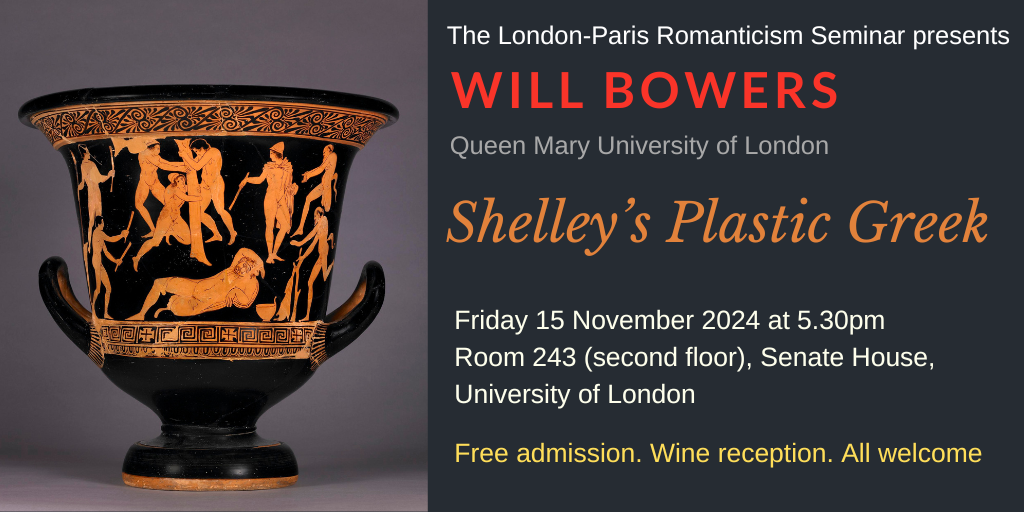
The next meeting of the London-Paris Romanticism Seminar will take place on Friday 15 November 2024 in Room 243 (second floor), Senate House, University of London, starting at 5.30 pm. As our distinguished guest speaker, we are delighted to welcome Dr Will Bowers of Queen Mary University of London, who will present a paper entitled Shelley’s Plastic Greek. This will be followed by a discussion and wine reception. The seminar will be chaired by Isobel Hurst (Goldsmiths, University of London).
The event is free and open to everyone, including postgraduates and members of the public. No booking is required.
Will Bowers is Senior Lecturer in Eighteenth-Century Literature and Thought at Queen Mary University of London. He has published essays on poets including Byron, Milton, Shelley, and Wordsworth, and his first book, The Italian Idea, came out with Cambridge University Press in 2020. He is an editor on the final two volumes of the Longman Shelley, which were released this summer, and has a further two ongoing editorial projects: an edition of Cowper’s Poem, Hymns, and Letters for World’s Classics (which he hopes to complete this winter), and a co-edited letters of Shelley for Oxford University Press (which won’t be complete for quite a few winters). He is also near the completion of co-authored critical study of Shelley’s Greek with Tom Phillips (Manchester).
Regarding the topic of his paper, Will writes:
“Shelley’s interest in Ancient Greece began in earnest on the banks of the Thames at Marlow in 1817, and it endured until his final days on the Bay of Spezia in 1822. The talk opens with an outline of Shelley’s approach to Greek literature and its reception, before considering how this might profitably be thought of as plastic and iconoclastic. It then runs through a teleology of Shelley’s study of Greek, before resting on two texts in which we can, in the words of Swinburne, ‘sift and test it by proof of syllable and letter’. First the 1818 translation of Euripides’ Cyclops, in which Shelley challenges Schlegel through an examination of Greek moral and practical ‘manners’. Second the ‘Ode to Naples’, which meditates on our classical inheritance in a form and a place heavy with the weight of tradition. These close readings appreciate the revitalising function of Shelley’s Greek—a process in which the poet ‘marks the before unapprehended relations of things and perpetuates their apprehension’—whereby the ancient past is recruited both to question our cultural present and to speculate on alternative futures.”